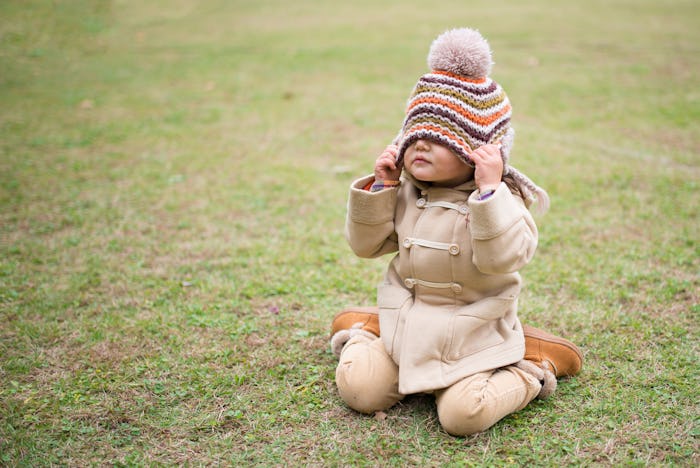Life

Everything You Need To Know About Social Anxiety In Toddlers
Toddler personalities come in every shape under the sun: While it's perfectly normal for a toddler to strike up a conversation with a total stranger, it's every bit as normal for one to be too shy to speak to anyone who isn't a family member. In most cases, such shyness is just a stage little ones will grow out of soon enough. But for some families, their toddler's fear of interpersonal interaction actually interferes with daily life. So at what point does shyness end and clinical anxiety begin? What does social anxiety look like in a toddler?
In a recent article published in Psychology Today, the warning signs of a toddler with social anxiety include the following: Discomfort in speaking to familiar children and adults, avoiding eye contact and mumbling when spoken to, blushing or trembling around others, crying or tantrum-ing when meeting new people, worrying intensely about saying or doing the wrong thing, complaining of physical problems like stomach aches, and withdrawing from activities in lieu of staying home.
Psychology Today noted that while it's helpful to identify potential problems early, they should be seen as learning opportunities to focus on. Resorting to labels and diagnoses should be avoided until absolutely necessary to get the treatment you need, since labels might carry a sense that there is something permanently wrong with the child.
The article also warned that labeling a child too early, "can erode confidence, as well as the natural learning and growing processes that would otherwise lead to the child overcoming the problem. Most times, solutions can be found without the use of a scary label."
But it's still not as simple as saying your child does or doesn't have social anxiety. According to pediatrician Dr. Jarret Patton, "Social anxiety in a toddler can be tricky. On one hand you want your toddler to be fearful of strangers, on the other hand you would like them to be social." In an exclusive interview with Romper, Patton elaborates, "Anxiety can present as a prolonged or overwhelming negative reaction to people in general, including family, friends, or strangers. Toddlers tend to pick up on cues from their parents about whether someone is safe or not. While a parent socializes with a friend, a toddler should be friendly and perhaps engaging. They should not typically cry, have a tantrum, or hide from a known individual. If your child has extreme reactions to most social situations, this should be discussed with your pediatrician."
Loving the children you've been given means accepting them with all their strengths and challenges, and being willing to help guide them in the areas in which they struggle. Manifestations of social anxiety in your toddler aren't reasons to fear or overreact, but simply an opportunity to meet his needs, make her feel understood, and guide them to a healthy relationship with the world around them.